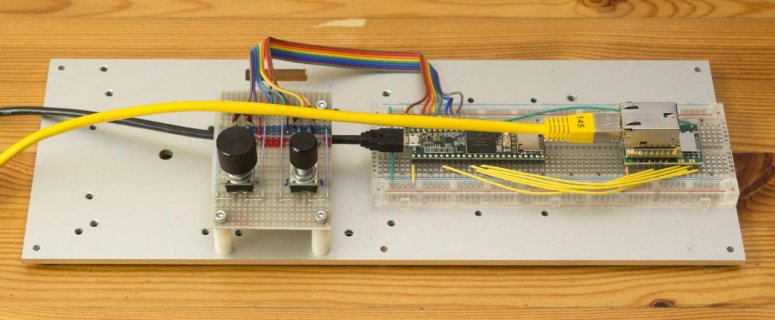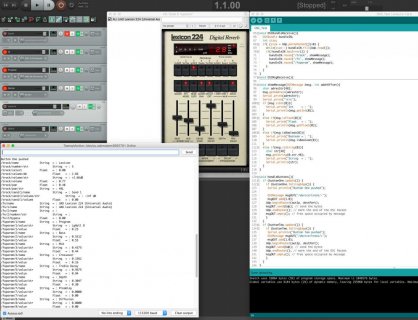Working on a Teensy based OSC (Open Sound Control) controller I have a question on how to handle messages mixed with bundles. All the examples are about either bundles or messages but not both. What would be a good solution for this?
Reaper is sending both bundles and messages. This is what the serial monitor output looks like when treating the input as messages:
Here's the code:
This is what my test setup looks like:

Two rotary encoders I had from a previous experiment, hardware debounced as suggested in the Bourns datasheet. The ethernet is handled by a wiz850io on the adapter board. On the hardware side everything is working perfectly. Now I have to figure out the software side of it.
This screenshot gives an overview of how things fit together (OSC treated as bundle):

The serial monitor shows the Reaper response after the left encoder button has been pressed making track 5 the selected track. All track parameters are sent complete with readable insert names and all. Even the effect parameter names are complete and not some cryptic six character summary like with the Mackie MCU or HUI protocols. A nice benefit of using OSC communication in stead of MIDI is the fact that Reaper does not complain about missing midi devices when compiling and uploading the code to the Teensy but the most important part is the level of detail in the messages. What I've seen so far opens up a whole new range of possibilities.
Reaper is sending both bundles and messages. This is what the serial monitor output looks like when treating the input as messages:
Code:
Receiving OSC Message...
Adres = : #bundle
Receiving OSC Message...
/track/4/pan Float = : 0.48
Adres = : /track/4/pan
Receiving OSC Message...
Adres = : #bundleHere's the code:
Code:
// OSC test code
#include <Bounce.h>
#include <Encoder.h>
#include <SPI.h>
#include <Ethernet.h>
#include <EthernetUdp.h>
#include <OSCBundle.h>
// ***** BUTTONS *****
#define BUTTON_ONE_PIN 20
#define BUTTON_TWO_PIN 21
int debounceTime=5;
Bounce buttonOne = Bounce(BUTTON_ONE_PIN,debounceTime);
Bounce buttonTwo = Bounce(BUTTON_TWO_PIN,debounceTime);
elapsedMicros sinceButtonCheck; // timer for button check
unsigned int buttonCheckInterval=1000; // interval in microseconds for checking buttons
// ***** END BUTTONS *****
// ***** ENCODERS *****
Encoder encoderOne(18,19);
Encoder encoderTwo(22,23);
long currentEncoderOneValue=0;
long currentEncoderTwoValue=0;
// you can find this written on the board of some Arduino Ethernets or shields; I couldn't find it but it does not matter :-)
byte mac[] = { 0xDE, 0xAD, 0xBE, 0xEF, 0xFE, 0xED };
//ports
const unsigned int serverPort = 8000; // Reaper Out port
const unsigned int destPort = 9000; // Reaper IN port
//Create UDP message object
EthernetUDP Udp;
//the Teensy's IP
IPAddress ip(192, 168, 178, 177);
//destination IP
IPAddress outIp(192,168,178,38);
void setup(){
Serial.begin(115200);
Serial.println("OSC test");
pinMode(BUTTON_ONE_PIN, INPUT_PULLUP);
pinMode(BUTTON_TWO_PIN, INPUT_PULLUP);
//setup ethernet part
Ethernet.begin(mac,ip);
Udp.begin(serverPort);
}
void loop(){
//process received messages
OSCMsgReceive();
//OSCBundleReceive();
// check elapsedMicros and millis timers
if (sinceButtonCheck >=buttonCheckInterval) {
sinceButtonCheck = sinceButtonCheck - buttonCheckInterval;
handleButtons();
handleEncoders();
}
}
void OSCBundleReceive(){
OSCBundle bundleIN;
int size;
if( (size = Udp.parsePacket())>0) {
while(size--) bundleIN.fill(Udp.read());
if(!bundleIN.hasError()) {
bundleIN.route("/track", showMessage);
bundleIN.route("/fx", showMessage);
bundleIN.route("/fxparam", showMessage);
}
}
}
void OSCMsgReceive(){
OSCMessage msgIN;
int size;
char str[32];
if((size = Udp.parsePacket())>0){
while(size--)
msgIN.fill(Udp.read());
if(!msgIN.hasError()){
Serial.println("Receiving OSC Message...");
msgIN.route("/track",showMessage);
msgIN.getAddress(str);
Serial.print("Adres = : ");
Serial.println(str);
}
}
}
void showMessage(OSCMessage &msg, int addrOffset){
char adresStr[48];
msg.getAddress(adresStr);
Serial.print(adresStr);
Serial.print("\t\t");
if (msg.isInt(0)){
Serial.print("Int = : ");
Serial.println(msg.getInt(0));
}
else if(msg.isFloat(0)){
Serial.print("Float = : ");
Serial.println(msg.getFloat(0));
}
else if(msg.isBoolean(0)){
Serial.print("Boolean = : ");
Serial.println(msg.isBoolean(0));
}
else if(msg.isString(0)){
char str[48] ;
msg.getString(0,str,48);
Serial.print("String = : ");
Serial.println(str);
}
}
void handleButtons(){
if (buttonOne.update()) {
if (buttonOne.fallingEdge()) {
Serial.println("Button One pushed");
OSCMessage msgOUT("/device/track/-");
msgOUT.add(1.0);
Udp.beginPacket(outIp, destPort);
msgOUT.send(Udp); // send the bytes
Udp.endPacket(); // mark the end of the OSC Packet
msgOUT.empty(); // free space occupied by message
}
}
if (buttonTwo.update()) {
if (buttonTwo.fallingEdge()) {
Serial.println("Button Two pushed");
OSCMessage msgOUT("/device/track/+");
msgOUT.add(1.0);
Udp.beginPacket(outIp, destPort);
msgOUT.send(Udp); // send the bytes
Udp.endPacket(); // mark the end of the OSC Packet
msgOUT.empty(); // free space occupied by message
}
}
}
void handleEncoders(){
// long for new encoder value
long newEncoderValue = 0;
// Encoder One
newEncoderValue=encoderOne.read();
if (newEncoderValue!=currentEncoderOneValue){
currentEncoderOneValue=newEncoderValue;
Serial.println(currentEncoderOneValue);
}
// Encoder Two
newEncoderValue=encoderTwo.read();
if (newEncoderValue!=currentEncoderTwoValue){
currentEncoderTwoValue=newEncoderValue;
Serial.println(currentEncoderTwoValue);
}
}
void funcValue(OSCMessage &msg, int addrOffset ){
int value = msg.getFloat(0);
OSCMessage msgOUT("/Fader/Value");
Serial.print("Value = : ");
Serial.println(value);
msgOUT.add(value);
Udp.beginPacket(Udp.remoteIP(), destPort);
msgOUT.send(Udp); // send the bytes
Udp.endPacket(); // mark the end of the OSC Packet
msgOUT.empty(); // free space occupied by message
}This is what my test setup looks like:

Two rotary encoders I had from a previous experiment, hardware debounced as suggested in the Bourns datasheet. The ethernet is handled by a wiz850io on the adapter board. On the hardware side everything is working perfectly. Now I have to figure out the software side of it.
This screenshot gives an overview of how things fit together (OSC treated as bundle):

The serial monitor shows the Reaper response after the left encoder button has been pressed making track 5 the selected track. All track parameters are sent complete with readable insert names and all. Even the effect parameter names are complete and not some cryptic six character summary like with the Mackie MCU or HUI protocols. A nice benefit of using OSC communication in stead of MIDI is the fact that Reaper does not complain about missing midi devices when compiling and uploading the code to the Teensy but the most important part is the level of detail in the messages. What I've seen so far opens up a whole new range of possibilities.

